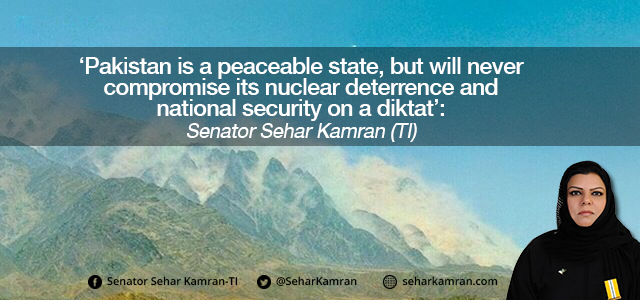 28th May 2018, Islamabad: : President Centre for Pakistan and Gulf Studies (CPGS), Senator Sehar Kamran, felicitated the nation today on the occasion of Youm-e-Takbeer, which marks the twentieth anniversary of Pakistan’s first nuclear tests.
28th May 2018, Islamabad: : President Centre for Pakistan and Gulf Studies (CPGS), Senator Sehar Kamran, felicitated the nation today on the occasion of Youm-e-Takbeer, which marks the twentieth anniversary of Pakistan’s first nuclear tests.
On 28th May 1998, Pakistan entered into the elite group of nuclear-weapons capable states. She stated that it was an incredible achievement, and a product of the vision and persistence – against great odds – of ‘Prime Minister Zulfiqar Ali Bhutto, the founder of Pakistan’s nuclear program, and the blood, sweat and sacrifices of our incredible scientists and citizens’.
‘On this day, let us also remember that this decision was not made lightly. Pakistan was compelled by the overt threats to its sovereignty and defence being made by the top Indian leadership as they tested India’s weapons. Where India chose to act belligerently, Pakistan’s tests undoubtedly rectified the balance of power in the region’. She also stated that it appeared twenty years on, we were once more finding ourselves in a similar position – compelled to maintain nuclear deterrence in the face of India’s modernizing program and an increasingly hostile political and diplomatic approach towards Pakistan.
‘Since 2014, India, under PM Narendra Modi, has been constantly challenging deterrence stability by increasing violence in Kashmir, on the LOC and WB’, she said. India’s hegemonic designs in the region are clearly visible in its actions, including but not limited to the introduction of nuclear submarines, nuclearization of the Indian Ocean, acquisition of Ballistic Missile Defense (BMD), in combination with its irresponsible CSD military strategy – which the country has now admitted to.
President CPGS further said that Pakistan is a peaceable country, but that should not be taken as a gesture of weakness. ‘We do not want a nuclear arms race, but that does not mean we will succumb to the diktats of any regional or extra regional power. Pakistan will continue its efforts to promote peace and stability at the regional and global levels.’
She said that Pakistan will continue to commit to the policy of credible minimum deterrence, while seeking the peaceful resolution of outstanding issues. ‘I believe that in the presence of nuclear capabilities, there is no space for misadventure and change of status quo, therefore it would be prudent of India to engage in a dialogue with Pakistan for the better future of the both the countries’, she stated.


